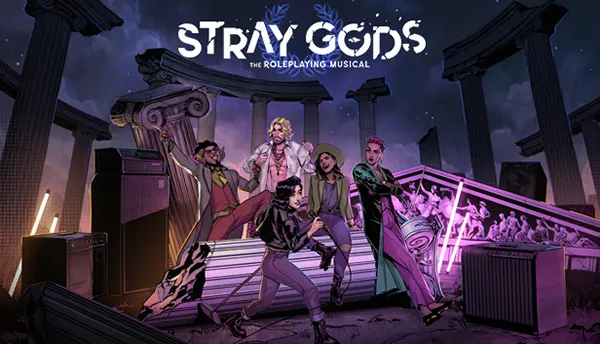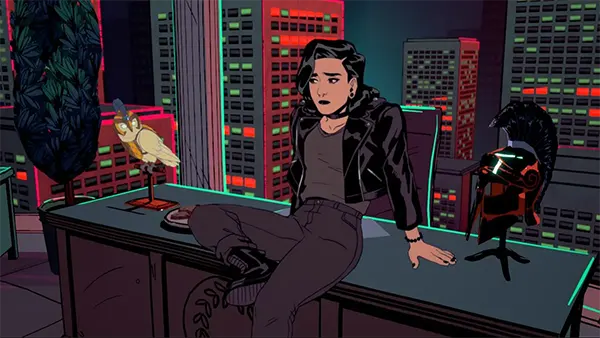Stray Gods: The Roleplaying Musical – Greek Mythology in a New Light

Stray Gods: The Roleplaying Musical is an ambitious title that redefines interactive storytelling by blending role-playing mechanics with musical performance. Developed by Summerfall Studios and released globally in August 2023, this game gained notable popularity into 2024 and continues to attract players through early 2025. It stands out not only due to its innovative format but also thanks to its unique portrayal of Greek gods in a contemporary setting.
The Fusion of Mythology and Music
The narrative of Stray Gods unfolds in a modern urban world where ancient Greek gods live among mortals, hidden from the public eye. The protagonist, Grace, suddenly inherits the powers of a Muse and becomes entangled in a murder mystery involving the gods. What sets the game apart is that the entire story is told through musical numbers, allowing players to shape the direction of each song based on dialogue choices.
This format is more than a novelty – it creates an immersive narrative environment where each player’s choices not only affect plot outcomes but also change the tone and lyrics of the music. The intertwining of music and myth breathes new life into familiar figures like Athena, Apollo, and Persephone, showing them as flawed, emotional beings who grapple with their immortality and past mistakes.
The music is not just background entertainment. Composed by Grammy-nominated Austin Wintory, it serves as a narrative engine, delivering emotional highs and lows, and reinforcing the themes of identity, loss, and redemption. The musical genre shifts with player choices, creating a personalised experience for each playthrough.
Innovative Storytelling and Player Agency
Unlike traditional RPGs, where cutscenes or combat drive the story forward, Stray Gods lets players direct the flow through musical dialogue trees. Every decision taken during a song can affect relationships, alliances, and even the outcome of the game. This level of control gives players a strong sense of authorship over Grace’s journey.
Player agency is reinforced by multiple branching paths that lead to different endings. This not only encourages replayability but also deepens emotional investment in the narrative. The choices often reflect moral ambiguity – siding with one god may alienate another, forcing the player to weigh consequences over quick rewards.
The combination of musical and role-playing elements is finely balanced, ensuring that fans of either genre feel at home. Whether you prefer to play it as an interactive musical or a decision-heavy RPG, the experience is engaging and surprisingly cohesive.
Visual Aesthetic and Voice Acting
Stray Gods features a distinctive hand-drawn art style reminiscent of graphic novels, with rich character designs and bold colour palettes that bring the gods to life. This stylistic approach complements the fantastical nature of the story while keeping players anchored in a grounded, modern setting.
Voice acting is another standout element. The cast includes prominent actors such as Laura Bailey as Grace, Troy Baker, Mary Elizabeth McGlynn, and Felicia Day. Their performances elevate the script, infusing each character with nuance and authenticity. The voice talent ensures that emotional beats land with the intended impact, whether through spoken dialogue or vocal performances during songs.
Animations during songs are fluid and expressive, subtly changing depending on the tone of the player’s choices. This dynamic visual feedback enhances the connection between player decisions and on-screen outcomes, reinforcing the game’s central theme of choice and consequence.
Music as a Gameplay Mechanic
The integration of music into gameplay goes beyond aesthetics – it’s the core mechanic. During key narrative moments, players choose the tone Grace will take in her songs: Charming, Kickass, or Clever. Each path affects the lyrics, rhythm, and interactions with other characters, creating a dynamic theatre-like experience.
Because the game is essentially a playable musical, its success heavily relies on the quality of its score and vocal execution. Fortunately, it excels in this area. Songs feel purposeful and are designed to reflect internal conflicts, progress the story, or reveal character motivations. The soundtrack is also available on major streaming platforms, allowing fans to revisit their favourite moments outside the game.
Timing and emotional resonance are key. The game provides cues for when players should choose responses, maintaining rhythm without turning the experience into a rhythm game. This approach lowers the barrier for entry while retaining the drama and spectacle of a live performance.

Community, Replayability and Ongoing Support
Since its release, Stray Gods has developed a dedicated community of fans who appreciate both its originality and its deep replay value. With multiple branching narratives and emotional arcs, many players return for additional playthroughs to see how alternate decisions change the outcomes or relationships.
Summerfall Studios has continued to engage with its player base through regular updates, Q&A sessions, and content teasers. In early 2025, the game remains active thanks to continuous fan interaction on platforms such as Reddit, Discord, and Twitter. Cosplay, fan art, and cover performances of the game’s songs further reflect its cultural impact.
There’s also ongoing speculation about possible expansions or sequels. While no official announcements have been made, the open-ended structure of the game’s universe leaves ample room for new characters, mythologies, or even other musical genres to be introduced in future titles.
Stray Gods in the 2025 Gaming Landscape
In a market often dominated by open-world action games and competitive multiplayer titles, Stray Gods stands out as a rare narrative gem. It appeals to those seeking rich storytelling, meaningful character development, and unique artistic expression. The fusion of mythology and modern musical theatre has carved out a niche that very few titles have explored.
By February 2025, it remains a relevant and frequently discussed game in online forums and media coverage. Critics praise its innovation and accessibility, while players continue to share their emotional responses to its characters and choices. Its success has also inspired similar hybrid titles that blend storytelling with other artistic forms.
Stray Gods represents more than just a game; it’s a showcase of what interactive media can achieve when developers take creative risks. Its lasting appeal suggests that future titles may follow its lead, creating even more ambitious blends of genre, storytelling, and performance.
